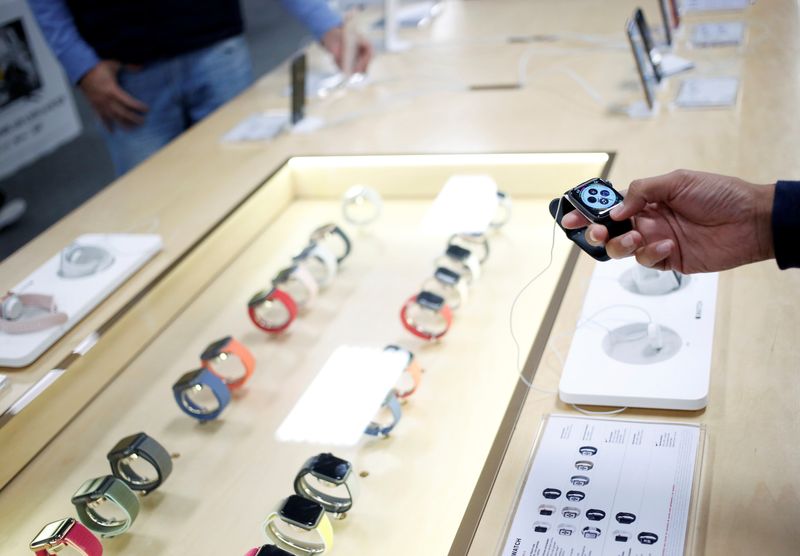By Blake Brittain
(Reuters) - A ban restricting imports of Apple (NASDAQ:AAPL)'s popular Apple Watches into the United States has gone into effect.
Here is a look at what the ban means for consumers and what is next for Apple.
Why was the ban imposed?
The U.S. International Trade Commission in October ordered Apple to stop importing and selling Apple Watches based on a complaint from medical-monitoring technology company Masimo (NASDAQ:MASI).
The ITC, a federal agency that handles international trade disputes, determined that an Apple Watch feature for reading blood-oxygen levels infringes Masimo's pulse oximetry patents.
The administration of President Joe Biden had 60 days, until Dec. 25, to veto the order based on public policy concerns but chose not to do so.
How are U.S. Apple Watch sales affected?
Cupertino, California-based Apple announced on Dec. 18 it would preemptively pause U.S. sales of its latest high-end Series 9 and Ultra 2 models ahead of the Christmas Day deadline. The ITC's order does not affect the lower-priced Apple Watch SE, which does not have pulse-oximetry capabilities and remains on sale at Apple.
The ITC decision says it applies only to Apple Watches with the light-based pulse oximetry capability in question, but does not specify which models with that technology are affected. Apple first introduced pulse oximetry in its Series 6 watches, and Masimo has argued that all Apple Watches with the technology infringe its patents.
Apple said it would also stop replacing out-of-warranty watches going back to Series 6 based on the ban.
The ban specifically applies to Apple and its "affiliated companies, parents, subsidiaries, or other related business entities," and may not affect other retailers selling Apple Watches.
Series 9 Apple Watches were still available from sellers including Amazon (NASDAQ:AMZN), Best Buy (NYSE:BBY) and Walmart (NYSE:WMT) as of Dec. 26.
What are the accusations against Apple?
Masimo, which released a watch last year that also reads blood-oxygen levels and tracks other health indicators, accused Apple of hiring away its employees and stealing its technology after discussing a potential collaboration. A jury trial on Masimo's allegations in California federal court ended with a mistrial in May and has not yet been rescheduled.
Apple has called Irvine, California-based Masimo's legal actions a scheme to clear a path for its competing smartwatch, and has countersued Masimo for patent infringement in Delaware federal court.
What are Apple's options now?
Apple is expected to appeal the ban to the U.S. Court of Appeals for the Federal Circuit in Washington. The ITC on Dec. 20 rejected Apple's bid to pause the ban during an appeal.
Apple is also reportedly working on software changes to enable its watches to operate without infringing Masimo's patents. It could resume importing and selling the watches if U.S. Customs and Border Protection approves the workaround.

Masimo has said that its patents cover hardware, and that a software fix would not work.
Masimo CEO Joe Kiani has also indicated that he is willing to settle the dispute.